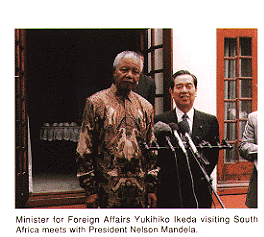Official Development Assistance (ODA)
Aid from Japan for the Reborn Republic of South Africa: The Republic Receives Its First ODA Loans from Japan
In April 1994, for the first time in its history, the Republic of South Africa held national elections in which all of its people -- including non-white citizens -- were invited to participate. As a result of those elections, the following month Nelson Mandela was installed as President of South Africa, and the policy of apartheid was put to an end. Having endured 26 years of exile and imprisonment, Mandela played a central role in the eventual democratization of his country, and South Africa's achievement in peacefully and democratically changing over to a new system of government in a spirit of national harmony and dialogue is deserving of the highest praise.
Having witnessed South Africa's triumphant embrace of democracy, Japan has unveiled aid measures to assist that nation totaling $300 million, the majority of which is devoted to easing the severe living conditions facing many of South Africa's non-white citizens. In April 1996, the very first of Japan's ODA loans to South Africa were provided in order to fund a large-scale effort to reform the enterprises supplying water to certain residential areas heavily populated by non-white citizens -- the KwaNdebele Region Water Augmentation Project -- and another effort known as the Rural Social Infrastructure Programme. Japan looks forward to further successful implementation of its aid policies for South Africa in the future.

